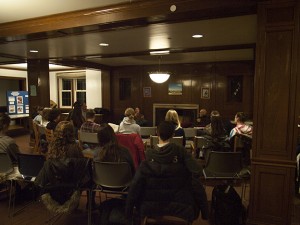Storrs, CT: With eating locally and sustainably on everybody’s mind the University of Connecticut chose Michael Pollan’s 2007 book, The Omnivore’s Dilemma, which focuses on the modern politics and perils of today’s food system, as the UConn Reads book of the year.
But encouraging students to simply read the book is not enough for many educators at the university.
“We were able to get a grant from UConn Reads to do an event to promote the ideas discussed in Pollan’s book,” the Farm manager of UConn Spring Valley Student Farm, Julia Cartabiano, said. “We are hoping that people will be more aware of what they are eating, where it’s coming from and make healthier, aware choices after tonight.”
The event, entitled Just Food! Or is it?, focused on the environmental, nutritional and sociological impacts of the corn based food system in the United States that the first section of Pollan’s book discusses.
“There are 94 million acres of corn planted in the United States,” Turfgrass Science Professor Karl Guillard told the more than 30 students who attended the event. “That’s bigger than all the New England states, New York and 70 percent of Pennsylvania combined.”
This was the first fact tossed out at the students to impress upon them how much corn has come to mean to the United States. But this huge amount of corn is not the sweet, yellow ears that most people think of.
“Corn is enormously effective at taking sunlight and turning it into energy for humans to use,” Hedley Freake, the head of the Nutritional Sciences Department at UConn, said. “It is a vehicle of cheap energy.”
This means energy for processed foods, for animal feeds, for ethanol, for export – leaving a very small amount for those summer barbecues.
When the panel was opened up for discussion, the students in attendance – many of which were from environmentally conscious clubs like Eco Husky, EcoHouse, Real Slow Foods and Community Gardens – pushed the professors to give them ways that they as US citizens and UConn students can work to live more sustainably and encourage change in the nation’s food system.
“What can we do about this?” was the first question asked by Real Slow Foods president Kayla Rutland who helped recruit the three faculty members on the panel. “I hear about these problems a lot but the discussion doesn’t always end in what can we do or how can we change.”
“There is a lot of power in consumerism,” Guillard said. “A lot of what’s being done in our agricultural system now is based on our decisions on what we buy.”
Freake continued Guillard’s sentiment by saying: “We can make a difference; we control what we put in our mouths and where we buy it.”
Although following the recent pushes to eat locally is very difficult in a state like Connecticut – where only about 2.5 – 3 percent of food sold consumed in the state is grown here as well – UConn Dining Services is striving to follow this advice by using the produce from the Spring Valley Student Farm as well as local apples throughout the Fall semester.
Events focusing on parts 2 and 3 of Michael Pollan’s book are currently in the works for later this Spring semester to inspire further thought, discussion and action in the realm of food and sustainability in the UConn community.
